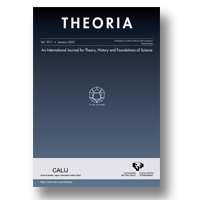|
monographic section |
|
21.
|
Theoria: An International Journal for Theory, History and Foundations of Science:
Volume >
35 >
Issue: 1
Una Stojnić, Ernie Lepore
Fodor and demonstratives in LOT
abstract |
view |
rights & permissions
| cited by
In this paper, we consider a range of puzzles for demonstratives in the language of thought we had raised in our last philosophical conversation we had with Jerry Fodor. We argue against the Kaplan-inspired indexing solution Fodor proposed to us, but offer a Fodor-friendly account of the demonstratives in the language of thought in its stead, building on our account of demonstrative pronouns in English.
|
|
|
|
|
articles |
|
22.
|
Theoria: An International Journal for Theory, History and Foundations of Science:
Volume >
35 >
Issue: 1
Víctor M. Verdejo
Norms for pure desire
abstract |
view |
rights & permissions
| cited by
According to a widespread, broadly Humean consensus, desires and other conative attitudes seem as such to be free from any normative constraints of rationality. However, rational subjects are also required to be attitude-coherent in ways that prima facie hold sway for desire. I here examine the plausibility of this idea by proposing several principles for coherent desire. These principles parallel principles for coherent belief and can be used to make a case for a kind of purely conative normativity. I consider several objections to a principle for consistent desiring and reply to them. I conclude that, if attitude-coherence is a mark of rationality, the broadly Humean consensus must be rejected.
|
|
|
|
|
23.
|
Theoria: An International Journal for Theory, History and Foundations of Science:
Volume >
35 >
Issue: 1
Stephen J. Schmidt
Resources and the acceptability of the Repugnant Conclusion
abstract |
view |
rights & permissions
| cited by
Parfit’s Repugnant Conclusion argues, against intuition, that for any world A, another world Z with higher population and minimal well-being is better. That intuition is incorrect because the argument has not considered resources that support well-being. Z must have many more resources supporting well-being than A does. Z is repugnant because it spreads those resources among too many people; another world with Z’s resources and fewer people, if available, would be far superior. But Z is still better than A; it is worth accepting its very large population to get the resources needed to support their well-being.
|
|
|
|
|
book reviews |
|
24.
|
Theoria: An International Journal for Theory, History and Foundations of Science:
Volume >
35 >
Issue: 1
Jesús Zamora Bonilla
Inmaculada de Melo-Martín, Kristen Intemann. 2018. The Fight Against Doubt: How to Bridge the Gap Between Scientists and the Public
view |
rights & permissions
| cited by
|
|
|
|
|
|
|
25.
|
Theoria: An International Journal for Theory, History and Foundations of Science:
Volume >
35 >
Issue: 1
Summary
view |
rights & permissions
| cited by
|
|
|
|
